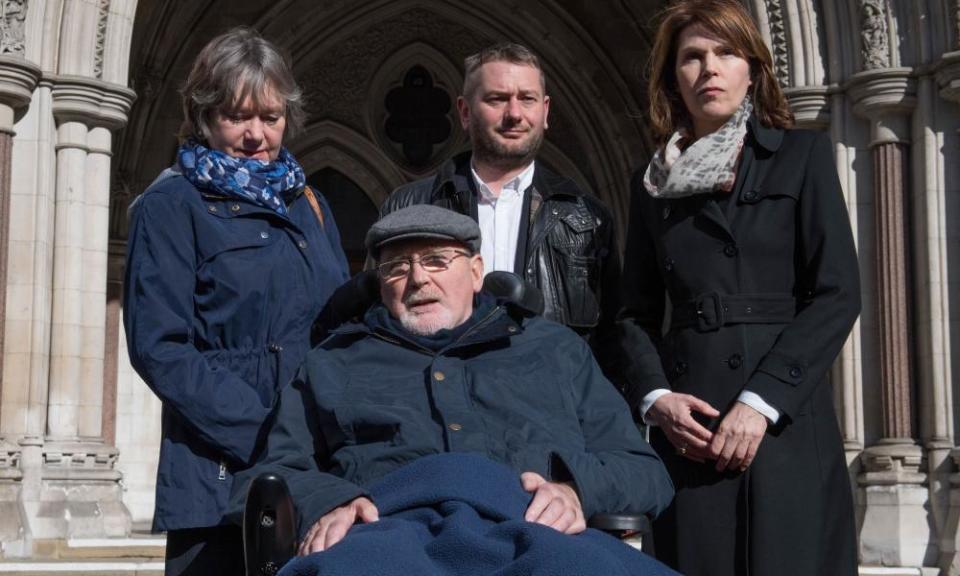The ban on assisted death ignores the reality of illnesses like dementia

Guernsey is an unlikely pioneer, but it might be the first place to break Britain’s last great taboo – the right to die peacefully at a time of your own choosing. The island’s parliament votes in May on an assisted dying bill, allowing terminally ill people the right to medical help to die, so long as they have only six months to live and are mentally competent. This may succeed, with the support of the island’s chief minister, Gavin St Pier.
Assisted dying is illegal in the UK under the Suicide Act of 1961, punishable with a sentence of up to 14 years in prison. Attempts to change the law at Westminster have been thwarted despite overwhelming public support, 82% in the latest poll. But religious objectors have blocked it time and again, with both Houses curiously packed with a disproportionate number of believers in this mostly atheistic country.
Someone from Britain travels to the Dignitas clinic in Switzerland on average every eight days for an assisted death. It’s not cheap, at £10,000, and it probably would not be much cheaper to travel to Guernsey. These death journeys are a grim option, when most people want to die at home surrounded by family and friends. Who doesn’t live in dread of losing their mind before their body gives out? The prospect of joining the swelling ranks of those with dementia who are warehoused in miserable nursing homes appals most people. So does the thought of being an intolerable burden to their family. But campaigners scrupulously avoid talking about the wider social landscape, the rocketing numbers of those with dementia outliving their brains at vast personal and social cost.
Anti-right to die campaigners claim that families would intimidate inconvenient old folk into signing their own death warrants to save nursing home fees. But cost is inevitably a part of the reason why we need this law: people receiving a diagnosis of dementia not only fear for themselves, but fear their savings will be wasted on nursing home fees to pointlessly prolong their lives.
Hard truths will not be faced. How do we pay for the massive increase in care for those with dementia?
Dementia is now the leading cause of death, the first time it has caused more deaths than heart disease. That stark fact should frighten us all, as the worst possible death is now the most likely. St Joseph, patron saint of the “good death”, who died of natural causes with Jesus and Mary at his side, will be working overtime: tradition does not record if he still had all his marbles. But the good death is what everyone wants: the right to choose it is as basic as all the other hard-earned freedoms we have over our own bodies.
This week analysis by the London School of Economics, commissioned by Alzheimer’s Research UK (paywall), warns that the NHS is unprepared for potential breakthroughs in dementia drugs. Treatments have failed so far, but 12 “potentially disease-modifying” drugs for Alzheimer’s are in the final stages of human clinical trials. Even taking into account some possible savings in health and social care, that could cost the NHS up to £9bn a year – and this doesn’t necessarily herald some miracle cure.
The health secretary, Jeremy Hunt, made a speech on Tuesday presaging the promised but constantly delayed green paper – yes, still only green – on social care. All he said about our collapsing social care system was that the cost would be capped for individuals, but not who should pay instead – the young? Nor a word on how to capture some of the untaxed property wealth of the older generation to pay for their own care.
Hard truths will not be faced. How do we pay for the massive increase in care for those with dementia? To do it decently is phenomenally expensive. To do it badly is brutish cruelty. What priority should we give their care over, say, improving the retreating life chances of children? No one is meant to mention these tough choices in the same breath as the right to die, but of course they are closely connected.
If, like me, you have watched a beloved parent die in needless pain, longing for an end the doctors denied her, then you know this is a personal right everyone deserves. Evidence from other countries shows that even if people don’t use that right, their fears are put to rest knowing that, if terminal pain becomes unbearable, the choice is there. Denying that choice is sadistic. But beyond terminal illness, the fear of dying of dementia is terrible too, and a living will should allow us to end our lives to avoid that.
• Polly Toynbee is a Guardian columnist

 Yahoo News
Yahoo News 